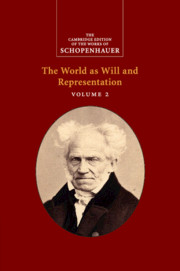Chapter 26 - On Teleology
Published online by Cambridge University Press: 30 June 2022
Summary
The total purposiveness of organic nature with respect to the continued existence of every being, along with its conformity to the inorganic, cannot be easily accommodated by a philosophical system that does not postulate a will at the foundation of the existence of every natural being, a will that therefore expresses its being and striving not in the first instance only in actions but also in the shape of the organism that appears. In the previous chapter I merely hinted at the account of this topic that grows out of our train of thought, having already demonstrated it in the passage of the First Volume cited below, and with particular clarity and thoroughness in the Will in Nature under the heading ‘Comparative Anatomy’. The following remarks will take up from that point.
The sense of wonder that threatens to overwhelm us when we consider the endless purposiveness of the structure of organic beings is due fundamentally to the natural but false presupposition that this agreement of the parts with each other, with the whole of the organism, and with its goals in the external world, as we apprehend and judge it by means of cognition, and thus along the path of representation, has also been produced in the same way; hence, that as it exists for the intellect, it was also brought about by an intellect. Of course, we can produce something that conforms to rule and law, such as is the case with any crystal for instance, only under the guidance of laws and rules, and likewise we can make something purposive only when guided by a concept of the purpose: but there is no justification for transferring this limitation of ours to nature, which is itself something prior to any intellect and whose workings, as was mentioned in the previous chapter, are utterly different in kind from our own. Nature produces things that look so purposive and so deliberate but does this without deliberation and without a concept of any purpose because it lacks any representation, which has a completely secondary origin. Let us begin by considering things that are merely regular but not yet purposive.
- Type
- Chapter
- Information
- Schopenhauer: The World as Will and Representation , pp. 341 - 356Publisher: Cambridge University PressPrint publication year: 2018

